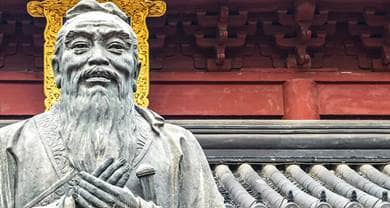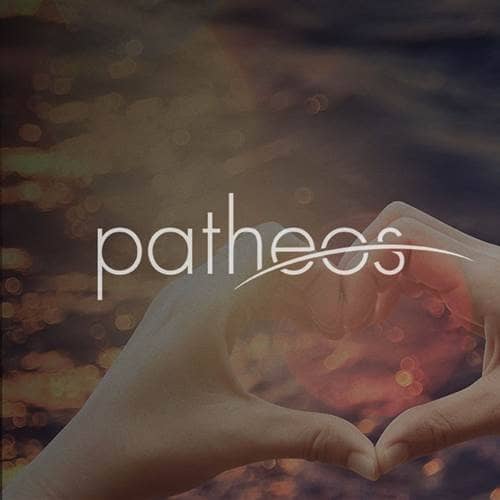- Trending:
- Pope Leo Xiv
- |
- Israel
- |
- Trump
- |
- Social Justice
- |
- Peace
- |
- Love

RELIGION LIBRARY
Confucianism
Ultimate Reality and Divine Beings
Kongzi did not deny the existence of a reality beyond the human world, but he taught that human traditions are sufficient for providing people with the moral guidance that they require in order to be virtuous and make the world a better place. Thus, for Confucians, human relationships and distinctively human activities, such as reading and writing literature and listening to and performing music, bring human beings into contact with the transcendent and communicate something of its nature.
Kongzi's record of silence on the subject of the divine is attested in several passages of the Lunyu (5:3, 7:21, 11:12). Because he apparently did not discuss deities, later readers of the Lunyu have concluded that he was an agnostic or atheist. In fact, as a child of the late Zhou world, Kongzi inherited a great many religious sensibilities, including theistic ones. For the early Chinese (c. 16th century B.C.E.), the world was controlled by an all-powerful deity, "The Lord on High" (Shangdi), to whom entreaties were made in the first known Chinese texts, inscriptions found on animal bones offered in divinatory sacrifice. As the Zhou polity emerged and triumphed over the previous Shang tribal rule, Zhou apologists began to regard their deity, Tian ("Sky" or "Heaven") as synonymous with Shangdi, the deity of the deposed Shang kings, and explained the decline of Shang and the rise of Zhou as a consequence of a change in Tianming ("the mandate of Heaven"). Thus, theistic justifications for conquest and rulership were present very early in Chinese history.
 By the time of Kongzi, the concept of Tian appears to have changed slightly. For one thing, the ritual complex of Zhou diviners, which served to ascertain the will of Tian for the benefit of the king, had collapsed with Zhou rule itself. At the same time, the network of religious obligations to manifold divinities, local spirits, and ancestors does not seem to have ceased with the fall of the Zhou, and Kongzi appears to uphold sacrifices to "gods and ghosts" as consistent with "transmitting" noble tradition. Yet, in the Lunyu, a new aspect of Tian emerges. For the Kongzi of the Lunyu, discerning the will of Tian and reconciling it with his own moral compass sometimes proves to be a troubling exercise:
By the time of Kongzi, the concept of Tian appears to have changed slightly. For one thing, the ritual complex of Zhou diviners, which served to ascertain the will of Tian for the benefit of the king, had collapsed with Zhou rule itself. At the same time, the network of religious obligations to manifold divinities, local spirits, and ancestors does not seem to have ceased with the fall of the Zhou, and Kongzi appears to uphold sacrifices to "gods and ghosts" as consistent with "transmitting" noble tradition. Yet, in the Lunyu, a new aspect of Tian emerges. For the Kongzi of the Lunyu, discerning the will of Tian and reconciling it with his own moral compass sometimes proves to be a troubling exercise:
If Tian is about to abandon this culture, those who die afterwards will not get to share in it; if Tian has not yet abandoned this culture, what can [Kongzi's enemies] do to me? (9:5)
There is no one who recognizes me.... I neither resent Tian nor blame humanity. In learning about the lower I have understood the higher. The one who recognizes me -- wouldn't that be Tian? (14:35)
Tian has abandoned me! Tian has abandoned me! (11:9)
Kongzi seems to be of two minds about Tian. At times, he is convinced that he enjoys the personal protection and sanction of Tian, and thus defies his mortal opponents as he wages his campaign of moral instruction and reform. At other moments, however, he seems caught in the throes of existential despair, wondering if he has lost his divine backer at last. Tian seems to participate in qualities of "fate" and "nature" as well as those of "deity." What remains consistent throughout Kongzi' discourses on Tian is his threefold assumption about this extrahuman, absolute power in the universe: (1) its alignment with moral goodness, (2) its dependence on human agents to actualize its will, and (3) the variable, unpredictable nature of its associations with mortal actors. Thus, to the extent that the Kongzi of the Lunyu is concerned with justifying the ways of Tian to humanity, he tends to do so without questioning these three assumptions about the nature of Tian, which are rooted deep in the Chinese past.
Later Confucian thinkers share Kongzi's vision of human beings as communing with the cosmic source of moral order, but (perhaps influenced by Buddhist and Taoist traditions) tend to describe that source in more metaphysical terms. Zhu Xi, for example, envisioned human beings as a crucial link in a "great chain" that extended from the primeval, undifferentiated qi (vital energy) of the universe through its division into the complementary opposites of yin and yang, which in turn generate the five elements or phases (earth, wood, fire, water, metal) to create heaven, earth, and all beings. According to Zhu, because li (cosmic principle) is inscribed in the human heart-mind, humans are uniquely capable of both understanding this cosmic creative process and actively participating in it.
 Here, Zhu drew extensively on his predecessor Zhou Dunyi (1017-1073 C.E.)'s Taiji tu shuo (Explanation of the Diagram of the Supreme Polarity), which explained how the image of yin and yang illustrated the dynamic interplay of opposites in the ongoing development of the universe. True to the humanistic spirit of the Confucian tradition, both Zhou and Zhu saw human beings as playing a vital role in that continuous cosmic drama whereby the raw material of qi assumed the shape formed by the master pattern of li.
Here, Zhu drew extensively on his predecessor Zhou Dunyi (1017-1073 C.E.)'s Taiji tu shuo (Explanation of the Diagram of the Supreme Polarity), which explained how the image of yin and yang illustrated the dynamic interplay of opposites in the ongoing development of the universe. True to the humanistic spirit of the Confucian tradition, both Zhou and Zhu saw human beings as playing a vital role in that continuous cosmic drama whereby the raw material of qi assumed the shape formed by the master pattern of li.
Still later, Wang Yangming (1472-1529 C.E.) would argue that not only is li interchangeable with Tian, li can be found in and discerned by the human heart-mind, and in fact, li is none other than the human heart-mind. Thus, for Wang, to know oneself fully is to comprehend the universe and the source of the universe's moral and creative order: "The heart-mind is the master of heaven, earth and all beings. The heart-mind is none other than Tian. If we mention the heart-mind, heaven, earth and all beings all are also mentioned automatically."
 In summary, it might be said that Confucian thought does not tend to draw an absolute distinction between appearance and reality, or between the natural and the supernatural. All agents, entities, and processes -- including both human beings and Tian -- are part of a unified, natural cosmos. Thus, human beings are organically linked to everything else in the universe, and can learn to deepen that kinship and harness its spiritual power by cultivating the cosmic within themselves. This tendency toward "self-divinization" in Confucianism has parallels with both Buddhist and Taoist traditions, but takes on a distinctively Confucian flavor insofar as the cultivation of one's "divine" nature is connected with the development of social virtues such as filiality, ritual propriety, and so forth.
In summary, it might be said that Confucian thought does not tend to draw an absolute distinction between appearance and reality, or between the natural and the supernatural. All agents, entities, and processes -- including both human beings and Tian -- are part of a unified, natural cosmos. Thus, human beings are organically linked to everything else in the universe, and can learn to deepen that kinship and harness its spiritual power by cultivating the cosmic within themselves. This tendency toward "self-divinization" in Confucianism has parallels with both Buddhist and Taoist traditions, but takes on a distinctively Confucian flavor insofar as the cultivation of one's "divine" nature is connected with the development of social virtues such as filiality, ritual propriety, and so forth.
Study Questions:
1. Is Tian (Heaven) the Confucian equivalent of God?
2. How do Confucians believe that human beings relate to the divine?
3. What is the role of the supernatural in Confucian thought?










